Leopold Wenger's letters from the Eastern Front, Nov 1943-Feb 1944
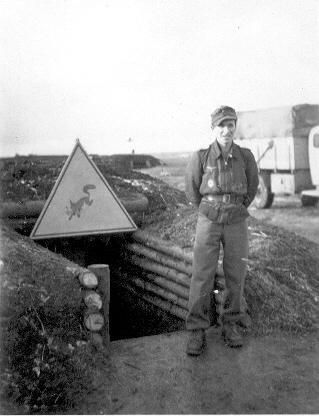
Oberleutnant Poldi Wenger stands at his squadron's [13th/SG10] command bunker at Koskov, in Ukraine, in January 1944. Note their "red fox" insignia above the entrance.
copyright 2014 Wilhelm Wenger and Carolyn Yeager
Translated from the German by Carlos Whitlock Porter
VIENNA - Officers’ military hospital
3 October 1943: I had hardly gotten here when they stuck me in bed again, which didn’t hardly please me. I’m in a military hospital here, officers only. There are four of us to a room, all of them sick; there are no wounded, and it’s nowhere near as beautiful as Constance. Now, once again, I’ve got a thick bandage on my knee and once again, the famous black ointment “Ichtiol” on it.
A few days ago I travelled to Meersburg [on the other side of the Lake Constance], which Mom had described to me as being so beautiful. I’m very glad to have undertaken this short outing; I really didn’t regret it. [Poldi received a visit from a lady friend of some years standing, one of the Luftwaffe auxiliary personnel, whom he had met in France; they travelled together on the trip to Meersberg. -WW]
Here in Vienna, visits are only permitted three times a week; but I very much hope that Father and Mother will be able to make it here together. In other respects our superiors here are rather strict; nevertheless I hope [sentence cut off]
[I myself was in Linz an der Donau at this time, assigned to the anti-aircraft auxiliary personnel as an anti-aircraft gunner, where I also attended grammar school at the Humanities High School at Marburg an der Drau. I was supposed to go to Leoben on holiday in the next few days and wanted to spend the holiday with our parents there together with Bibi (Poldi). -WW]
28 October 1943: a letter to Poldi from Commissioned Officer Unger:
Herr Oberleutnant !
I received the letter dated the 21st of the month; it made everybody cheer when they heard of the forthcoming return of their Oberleutnant. Our joy was unfortunately dampened again by the events of the 23rd., Lieutenant Stelzer got caught in a balloon barrage at Paris during a flight to Vannes. He was able to make it back to base despite serious damage to the aileron (three quarters of the aileron were knocked off); the journey was only shortened by the fact Lt. Stelzer attempted a pancake landing, during which the plane did a half-roll and side-slipped. Lt. Stelzer was killed and we buried him in Paris two days later.
Major Gromaner returned to the group a few days ago, and should, I believe, become IC with the squadron. For the time being he can’t fly, and still walks with a stick. The ULK [Non-Commissioned Officer Training Course] has been extended. Major Schumann had to abandon a written work on Bismarck and furthermore seems to take a rather dim view of [Bismarks’s] military achievements; that’s the reason for the extension. Fips is the worst off, and he would probably never have been promoted if Lt. Klein-Korres hadn’t been made course leader in the last two weeks. As Major Schumann said during a visit: “Well, Fips, that’s not very good, you know, that exam paper you just turned in, but it will have to do!” Schumann obtained some information on Fip’s training background, which was better, though. So it looks like he’ll pass the ULK anyway, as Oberleutnant Schreiner and the Hauptfeldwebel said; his career as an orderly would be finished, but it would cost me a few grey hairs, since we have Gefreiter Borkgrave as orderly for the moment, who is a thoroughly decent guy and also very willing, but who has no organizational talent. Fips is a little rogue, but as an orderly, he’s unique.
We had another little celebration yesterday, to which the Hauptfeldwebel, Oberfeldwebel Müller, Oberfeldwebel Groneberg, Feldwebel Gerkow, Feldwebel Schumacher and Unteroffizier Donath, who took care of the music, were invited. Feldwebel Schumacher, who had not, I believe, written to the Oberleutnant for a long time, is cooking for us, and cooks extremely well; he prepared an excellent evening meal for us. Our guests were totally astonished and very happy about it. The squadron doesn’t do its own cooking at the moment, so Feldwebel Schuhmacher isn’t required for the squadron at the moment, but we were quite worried about it, since Sieß isn’t there yet and there’s nobody else that can cook.
Unteroffizier Böhme has gotten married and is coming back from furlough in two days. Approval of Unteroffizier Ressi’s application for leave to get married is in the pipeline, so he’s coming back as a married man, so he’s bound to show up around mid-November. Unteroffizier Kirsch went to the marriage application hearing, so Unteroffizier Bogisch is still the old man here.
Our fighting preparedness is not as great as we had hoped it would be, that is, that we would be permitted to take off every time, on another mission. Things turned out otherwise; we’re in a state of constant battle readiness, but we’re only supposed to take off when it’s a really big deal and they need every man.
The group is supposed to report ready for action by mid-November. But for the moment we’re just flying practice flights with the new pilots in Cognac or someplace else in the south, where we’re supposed to teach them how to fly over the ocean; so until that’s done we won’t be doing much of anything. First we‘re supposed to fly a few missions Caen-style, after which any further missions will depend on the casualty rate.
In conclusion, I’d like to wish all the best to our Oberleutnant and we look forward to celebrating a happy reunion with our Oberleutnant.
Best wishes,
Unteruffizier Unger
1 November 1943: Dear Willy, We were lucky to able to get a holiday together, both at the same time. I am to be discharged on 3 November, and I plan to come home as soon as I can pack the few things I have. The best thing would be for you to be in Vienna on 3 November, in the afternoon. Meet me at the Southern Rail Station or at Uncle Karl’s! [Uncle Karl and Aunt Maria lived next to the train station.]
[We were indeed fortunate enough to get a furlough in November 1943 both at the same time, which we spent together with our parents and sister in Leoben. 'Bibi' was already feeling much better, relatively speaking, and took off from Leoben, where he spent a few more days after my departure, to rejoin his old unit in France. The intended destination was Caen, He was happy that he was going to be reunited with his old squadron after an absence of several months. But nothing came of it, since his unit was suddenly ordered East, and was already on its way to Russia by the time he arrived in Paris.
'Bibi' had to change trains in Linz, in the middle of his journey from Leoben to Paris; this was on 18 November 1943, the day before his 22nd birthday. I was informed of this, and was at the railway station in Linz to see him. 'Bibi' gave me a small package from our parents. We spent the few minutes of his brief stopover chatting happily and exuberantly. It was a cold day and you could really feel it. I was wearing the overcoat from my uniform, while Bibi was dressed only in uniform, without a coat; he was really freezing. When his train took off again, he leaned out of the window and waved at me for a long time, as he always did. It did not occur to me that I might never see him again. -WW]
21 November 1943: (on the way from France to Russia, at a stopover in Vienna): Listen and be astonished! I met Willy at the rail station in Linz and gave him the package. I then got a good connection to Paris and arrived there with a two-hour delay. I had no connection to Caen so I called my Standort and learned that there was nobody there, everyone was already gone. So I had to go all the way back the way I came. This afternoon I went through Linz and got a good view of Willy’s anti-aircraft position from the train. Unfortunately. I had been unable to notify him in advance that I would be passing through. I got back to Vienna around 14 hours and am travelling to Lemberg today. Thank God I'm no longer alone, I met a few stragglers.
RUSSIA - Fighter Pilot on the Eastern Front
24 November 1943: On 21 November I travelled from Vienna onwards with the furlough train and only woke up in the middle of ex-Poland. A desolate region—a filthy wasteland where it rains all the time. In Przemysl, we had to travel through the town from the west to the main railway station. And in the evening I arrived in Lemberg [Lviv]. There I was picked up by car and soon I was with people I knew again. I was now waiting for good weather, so as to be reunited with my squadron.
I got my winter clothing today. I can only say: “They’re really great!”. We are so well equipped, that it’s certain that nobody is going to freeze. I was issued real mountain climbing boots, just like I always wanted. Fur trousers, fur jacket, fur vest, fur cap, angora wool underwear, socks, wristlet, scarves, abdominal bandage, and a rubber raincoat constitute the principal articles of my wardrobe. But then every driver has his own special equipment, just like every technician or ordinary or flying personnel. You wouldn’t think it possible to manufacture these things at all in the 5th year of the war.
Morale is very good wherever you look and we‘re only hoping for better weather soon, so we get going again. One thing I find quite strange in this region is how early it gets dark. At 3 in the afternoon it’s already so dark that you have to turn on a light.
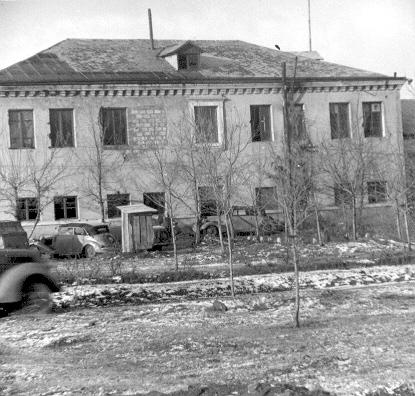
Poldi arrives at his final destination: the command post at Berditschew in the Ukraine
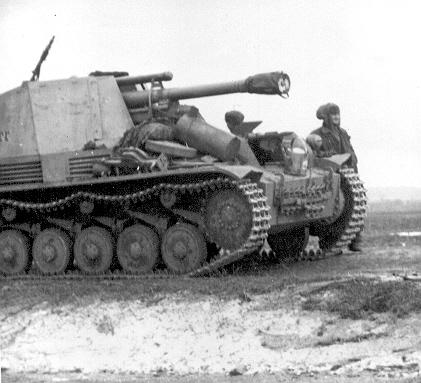
Storm artillery and tank at Berditschew December 1943
1 December 1943: I’ll try sending an air mail letter today and I’m curious to see just how long it takes to get to its destination. I’ll also send a couple of marks for Willy at the same time (for letters, 2 marks; for postcards and letter cards, 1 mark).
We’ve gotten a bit further into the “Soviet Paradise” since yesterday, and have achieved our immediate objective. So I flew yesterday for the first time in a long time [his last flight was in mid-July in Sicily and southern Italy -WW] and got my squadron to the correct position after one and a half hours. At first it seemed like everything was happening too fast for me, but I soon got used to it.
I was issued a rubber knee bandage today, which saves me the trouble of putting on an ordinary bandage every day and I’m really feeling OK.
I just heard that I was promoted to squadron commander just before they put me in the military hospital.
Otherwise I’m feeling quite well, and I’m getting used to the usual living conditions. We’re living on the edge of a ruined city [presumably Berdychev] and have had ample opportunity to be astonished at the inconceivable filth of the place over the past few days. I’ve installed a table and chair in my little room and will start real house-keeping in the next few days. There’s even electric light here, which is a real necessity since the sun goes down at 3 in the afternoon. There’s no more snow, but there’s rain enough to suit anybody, plus wind and cold, and plenty of mud and filth as a result.
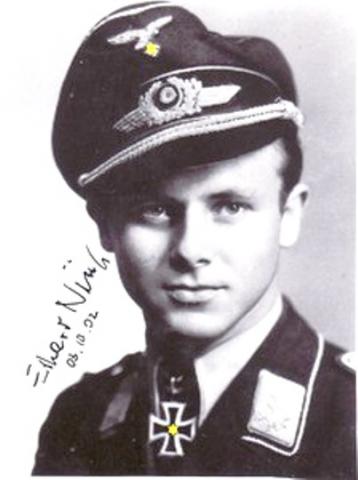
[A tragic accident occurred around this same time. The accident is recalled by Erhard Nippa (right, as a lieutenant during the war) in a letter dated Jan. 16, 1999:
“During the transfer to the Eastern Front in November or December 1943, Oberleutnant Kurt Eckleben, squad adjutant of Group II of SG 10 (under Hautptmann Götz Baumann) collided with the squadron commander of the 5th Squadron, Oberleutnant Busch near Mielec. Busch’s plane was cut completely in half by the propeller just behind the cabin, after which both cabin and motor naturally spiraled downwards to earth. Eckleben failed to get free of the plane in time and his parachute did not open completely. His death was especially tragic for us, because he had married young and was expecting his first child. Since we were flying in squadron formation and I was flying directly behind him and to the right with my squadron over the staff flight and the 5th squadron, I saw the whole accident from close up. Busch never recovered from this experience... and was correctly transferred back to Germany.” -WW]
6 December 1943: After an eventful day I’d like to send you a brief report of what happened.
Things really started happening on our section of the front early today. After our army commands reported for duty we flew mission after mission attacking retreating Soviet troops. Even during these first few short days, we achieved some great results, and we hope it will stay that way. You’ll probably hear something about it in tomorrow’s Armed Forces Report. From what we could see, it was already something tremendous. In the three low-level missions I flew today, I destroyed two guns and many horse-drawn and motorised vehicles and knocked over a whole load of Soviet infantry men to boot—despite bad weather. Our army was enthusiastic, so that this afternoon our commanding general expressed his appreciation for what we had done.
One of my pilots was shot down, did an emergency landing, got away and made his way back to our lines and reported to me this evening. We were overjoyed to see him again, I can tell you that. Now I’m catching up on my sleep. Otherwise everything is going very well for me and even my foot feels great. The air at high altitudes seems to do it good.
7 December 1943: Low-level attacks in the region east of Turtschinka, where we already bombarded artillery positions and horse-drawn vehicles yesterday. We’re providing good cover for our ground troops and we were mentioned again in the Armed Forces Report.
8 December 1943: (Letter to Willy in Linz, where he was serving as an anti-aircraft auxiliary) I got your letter yesterday evening, for which I thank you, except that it could have been a little bit longer.
In any case I’m happy to hear from you again at all. Can you make it home at Christmas? Can you get a furlough soon? You didn’t say whether you got to Neusiedlersee. [We often did target practice there with live ammunition, aiming at air bags pulled by airplanes. -WW]
I’m writing to you from our command post. The weather outside is absolutely impossible, as a result of which, of course, I shall not be flying today. When the weather’s good, all hell will break out, and
it’ll be just like old times: simply magnificent! The troops on our section of the front have been engaged in a heavy offensive since day before yesterday. The Bolsheviks were falling back in huge swarms and we’re giving them hell as best we can, with bombs, cannon and machine guns in low level-attacks, so the sparks are really flying. It’s like Sicily all over again, except that we have far more attractive targets and plenty of Bolsheviks to shoot at.
As I said, we’ve been waiting the whole morning but the fog is too thick, not to mention the snow, mixed with rain, so that it’s just endless. All we can do is hope for better weather, so as to get back on the job again.
You’re probably wondering how things look over here. Well, it’s just like the pictures you see in the Wochenschau [newsreels]. Filth, vermin and filthy Bolsheviks everywhere. But we’ve made ourselves at home here, even if it is a bit primitive compared to what we’re used to back home; it didn’t take us long to get set up and we feel alright. There are two soldiers‘ cinemas in our locality; they’re usually filled to the rafters an hour before the show even starts, but if you can squeeze yourself in there most of the films you see are quite good. We’re certainly standing up well to the cold, and unless there’s an unusually icy wind we don’t feel so bad most of the time.
When I get time I’ll send you the purchase confirmation for a German Cross in gold, and the money for it, too. In the meantime I’ve been issued a beautiful cloth emblem.
9 December 1943: I just heard that a mail plane is taking off for Germany and I want to take this quick opportunity to send you this. Since we’re having bad weather again and have to sit around prepared for combat all the time, this is the second day we’ve been sitting around doing nothing.
Day before yesterday, we had magnificent weather and did some really good work supporting our ground troops. The operation we’re on was also mentioned in the Armed Forces Report: in the region northeast of Zhitomir, etc... I even flew another two missions on the same day myself. Otherwise there’s really not much new to tell you. Willy wrote to me yesterday—a very brief letter, as always!
14 December 1943: Just flew 2 combat missions: low-level attacks with bombs, cannon and machine guns at artillery and gun positions, near Federowa, very heavy flak and machine gun fire. Also flew high-altitude and dive bombing attacks against Soviet infantry positions east of Malaya Ratschka.
15 December 1943: I flew my 100th combat mission on 12 December, flying 4 missions in the same day, first near Radomyschl and then near Zhitomir on the Tetrev river, etc. Low-level attacks against vehicles and artillery positions: during one of these combat missions I shot down an IL2 [armored Soviet combat fighter]. Since it was very tough aerial combat, I could no longer see the impact; another pilot said he also shot at it and claimed credit for shooting it down, although three men from my staff confirmed everything I said. So I gave up arguing about it since the lieutenant hadn’t gotten anything adjudicated yet. By that time we had achieved 3 kills in 5 days with the squadron. I hope it continues like that.
The Soviet fighter planes always do a bunk whenever they see us, even when they outnumber us. That’s because we always go on the offensive, whatever the position.
20 December 1943: Took off in Berditchew and landed in Kalinovka. Low-level attack with bombs, cannon and machine guns against motorized troops and artillery positions in the region of Gardichevka. One gun destroyed.
25 December 1943: Passed Christmas Eve very happily and I hope everybody in the family had a really nice time celebrating back home. Since the weather has been so bad that you couldn’t even see the other side of the central square, everybody spent the time busily preparing for the Holy Night before Christmas in a variety of ways. It was really a pleasure to watch all this feverish activity. And then it was time to celebrate. We all celebrated together, with the whole squadron. Several people divided up the big dormitory room for the purpose. They pushed all the tables and chairs together and set up Christmas trees, so the whole room—which is usually very ugly—would look pretty for Christmas.
Our field kitchen really did itself proud, and they distributed so much alcohol to the men that one could have stayed drunk for a week. Two NCOs played the accordion to provide some music. We read out a Christmas newsletter which we had printed for ourselves, and soon everybody was in a good mood. I was also able to announce the promotion of two sergeants and a couple of aircraftsmen first class, which naturally made everybody even happier. I was also able to produce ten bottles of wine and hard liquor from my chef’s allocation, which were then distributed to especially deserving persons.
And then the Commodore appeared (Wing Commander G. Jakob) and awarded me the front line flying clasp, which caused the whole squadron to give three cheers, which I answered with a bottle of cognac. Our commander (Hauptmann G. Baumann) also paid us a short visit during the celebration. I also received a beautiful model of my plane, a precise imitation, with movable propellers, Pitot tube and cannons, as a gift from the squadron.
Our Christmas Eve celebrations would have been really beautiful, a lotmore beautiful than it was, if the field post had gotten through to us. Sending things by air mail in this weather doesn’t make a lot of sense; at the most it takes a lot longer by air [than by land].
27 December 1943: I flew two additional missions today, but the weather was so bad you could hardly see your hand in front of your face, and I got so badly lost that I could only find my way back to the landing strip after an hour and a quarter. Apart from that, the whole mission only lasted between 20 and 40 minutes.
Unfortunately, our squadron lost another plane due to anti-aircraft fire today. I flew the first mission in the region of Gardyshevka. I destroyed a gun there; the second attack was a low-level bombing, cannon and machine-gun attack against Soviet infantry and occupied localities in the region around Andrushevka.
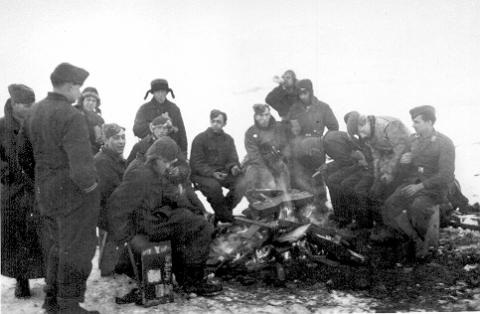 German troops on way back west stop at Berditschew, Ukraine and warm up around a fire on Dec. 29, 1943.
German troops on way back west stop at Berditschew, Ukraine and warm up around a fire on Dec. 29, 1943.
1 January 1944: High-altitude bombing attack with dive bombers against the enemy-occupied village of Kodnya. Heavy anti-artillery fire. Second mission: high-altitude bombing attack against Soviet columns on the Saiguri-Troyanov road.
3 January 1944: High-altitude bombing attack against Soviet trucks at the occupied locality of Bobrik (these attacks were flown from Koskov starting on 1 January.)

Planes in readiness at frozen airfield at Koskov, Ukraine on 1 January 1944.
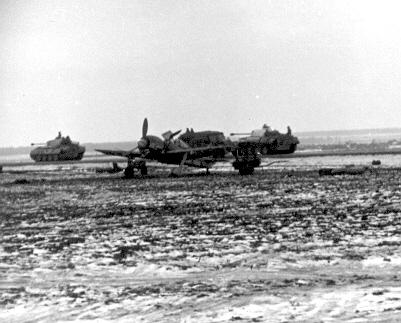
A week later on Koskov field: Panzers and planes together. With the thaw comes the mud.
5 January 1944: Congratulations on Dad’s War Service Cross.
I was really lucky today! During my mission, my steering cable was shot through and I was still able to bring my plane straight back to our landing field. Since I had to do a belly-flop landing at high speed, my plane was totally destroyed; I escaped without a scratch. Only my knee got a bit bumped about. It was no longer possible to steer the plane using the stick, but I kept it in the air using the electrical trimming and could only land at high velocity.
[Lt. Erhard Nippa witnessed Poldi’s high-speed belly-flop landing and estimated that the landing strip was not long enough to come to a stop without hitting anything, as a result of which Poldi crashed through the barrier along the edge of the field and disappeared in a gigantic cloud of smoke. Nobody thought his life was worth a plugged nickel at that point, but Poldi’s ghostly form suddenly appeared, crawling out of the billows of dust and smoke practically uninjured, while the plane was completely smashed. The very next day Poldi was already at it again, flying two more bombing, cannon and machine gun attacks in a new FW 190 against Soviet troops near Korovintsy, during which he seriously damaged a Soviet IL-2 aircraft and received a direct hit himself. The second mission was a high-altitude bombing attack in the same locality. -WW]
7 January 1944: Flew two missions today: a dive-bombing attack from high-altitude against the Soviet-occupied city of Yanushpol; plus a second low-level bombing mission against the same armed forces.
11 January 1944: We took off from Proskurov this time, dive-bombing attacks against the locality of Voronovitsa.
12 January 1944: We’ve been flying mission after mission, steadily, over the past few days. The weather is often too bad to fly, so we just waste time doing more or less nothing, waiting around and passing the time with this and that. This time I was stationed in a stinking little shack near Kashubiya, but at least now I’ve got a nice room with another Oberleutnant in a real house with electric light. We can listen to the radio again, so for the moment we know what’s going on along other sections of the front; so far, so good. [According to the flight log book he was taking off from Vinnitsa -WW]
Flew four missions today: high-altitude and dive-bombing attacks against the heavily Soviet-occupied position of Rossosh. Heavy flak, not only there, but around Berezovka and Yasenki as well (with heavy fighter defenses, too) and high-altitude attacks against the enemy-occupied locality of Strutinka.
We’re not getting mail anymore. The last time I received a letter was some time before Christmas, so I don’t know what’s going on at home or, above all, how you are. I hope Dad is still home and that Willy is still around Leoben [yes!]. The best thing, of course, would be for Mom to go to Gleichenberg with the children right away. I hope you‘ve been getting my letters regularly. I’m anxious to know whether all the news I’ve been sending you has actually reached you. I also sent my original German Cross in gold home to Germany with a non-commissioned officer. It occurs to me that I also sent you two flight log books by registered mail, the delivery of which has now been confirmed. I haven’t written to the Gauleiter yet. Should I really answer him?
Somebody gave me the stick from my destroyed plane as a present; wasn’t that a nice thing to do?
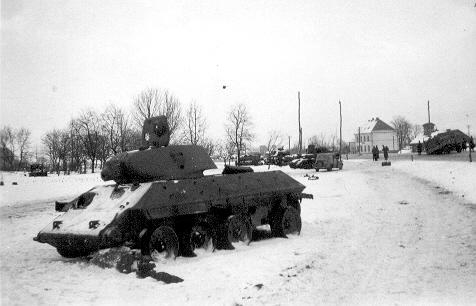
A disabled T34 Russian tank near Gramowka, Ukraine in January 1944.
19 January 1944: We finally got our mail today, to our great joy. We didn’t get any letters, but we got a whole load of Christmas presents. I was transferred to a new location today [Gramowka?]; I’ve already changed locations six times during my stay in Russia.
We’ve had very bad weather for two days now, with fog, black ice, rain, snow and very low temperatures. My living quarters, in which I’m spending the day today, since I have a day off, is quite nice and was made a lot homier by the arrival of all the magnificent Christmas presents. The tiled stove in our room doesn’t get very hot but when it gets dark and we have nothing in particular to do, we go straight to bed anyway. I got my hands on another padded sleeping bag with zipper fastening, and hitting the sack is just about the most beautiful thing in the world right now.
A film group was here a few days ago and showed us a few films. We saw two films right away, the same evening, a sort of down payment against future deliveries. The region around here is absolutely miserable; no bigger villages anywhere for miles around, just these horrible Russian cottages...... and a lot of snow. As far as the landscape is concerned, it’s already very beautiful around here and very fertile (we killed a calf again today).
I gave a package with chocolate and other stuff to somebody going on furlough, to take back to Germany. I hope these things arrive safely and you like them. Finally, I hope to hear from you again soon.
22 January 1944: Today was another big day: we got our mail at last! So at last I know how you spent Christmas at home in my absence. I’m especially happy to hear that Willy was able to be with you and that his wish to get home and be with you came true.
I’m doing very well, feeling like a million dollars. I don’t hardly need my walking stick at all any more, and I haven’t even gotten lice-infested yet! Things are going great and we’re able to fly again, just as we wanted. So morale is way up again. I’m going to write to Willy now. I’ve already written to the Gauleiter and [Hitler Youth] Bannführer; written like a soldier: terse and laconic.
22 January 1944: Dear Little Brother! I got a letter from Mother today and learned all about the Christmas celebrations. I was glad to hear that you were able to make it home, that really made me happy. Couldn’t you get transferred closer to Leoben? That would be even better, if you could be closer to home.
Did you ever find out when you’ll be called up for the RAD [Reichs Labor Service] or the Air Force? You could easily tell me a bit more about it. I hope you’ll have enough time to do that for me. For my part, I can tell you all kinds of things about how we spent Christmas here, and so on ….
I don’t know whether you know that I went through another belly-flop landing as the result of a single direct hit with a machine gun bullet that damaged my steering cable. That is, the cable that activates the elevator was shot clean through and was inoperable, but I was still able to reach the landing field at high speed using the electrical trimming. Of course, the plane ended up in the fields far off the end of the runway. I just received the stick as a souvenir.
Well, since there was good weather in the past few days we’ve flown a lot of missions. Today, for example, we convoyed a squadron of Junker Ju 88 planes and then we all attacked a Soviet divisional headquarters together. I can tell you: we really stirred up some dust! I flew an even longer mission the same afternoon. At one point, I surprised an armored Soviet ground attack plane. Since I hadn’t dropped my bombs yet it wasn’t easy dodging around in aerial combat but I managed to score a direct hit on the cabin. You don’t see those guys very often, and unless they’ve really got you outnumbered they usually avoid you like the plague.
4 February 1944: Since I got two letters from you yesterday evening as well as one from Willy, I want to answer right away. Thanks for the pictures, which are really nice. I think I’ve received all your letters now, at long last. The reason for the delays is that the flying squadrons, that’s us, are always away whenever there’s good weather and we have to depend on liaison aircraft; they carry mail, but they’re stationed at support points far behind us. So it sometimes happens that by the time the mail gets to the front line airstrip where they think we are, we’ve already been someplace else for a long time. In any case, I’m especially happy to say that the mail is getting to us at regular intervals now – or what you might call regular intervals.
I stopped writing just now because it was time for dinner and we had a film presentation right afterwards. Now to your letter: I can’t send Dad the Christmas reports since we rarely get a chance to listen to the radio and there are no newspapers here. You asked me what the region around here looks like. Well, it looks like spring. There’s no more snow, just water, and a lot of mud and filth; I can’t really describe it. You can’t imagine how much filth there is around here.
In bad weather we catch up on our sleep, which we don‘t usually get enough of. I think you asked how things are going generally. Well, there‘s a lot of lead and iron flying around, the air is full of it. The Soviets have been catching a lot of hell again since this morning. They got all their aircraft together against us and we’re having rather a lot of aerial combat. I got a Red fighter plane in my sights yesterday and just as I was about to start shooting, all my guns jammed. It makes you really mad to get in such a pickle, just when you’ve got one of them in your sights.
Our position was attacked today, but we were ready for them. We had a bit of a celebration again yesterday: it was my 150th combat flight mission. We flew some beautiful missions again today, together with the dive bombers. But there was so much water all over the place that you practically needed a sea plane just to land. I’m fit as a fiddle, just as well as ever. I almost never have any problems with my knee. I also got vaccinated against typhus, which is carried by fleas – the dear little bastards can come get me now if they want (but I hope they’re slow about it).
Otherwise the days are passing quickly. It gets dark at 4 in the afternoon, so there’s nothing to do but eat and hit the sack. I’m usually fast asleep by 7 in the evening and wake up at 5, fresh and lively again. So, now you know enough about me. Please write soon and let me know how it’s going with the two little ones, and how things are going where Willy is concerned. I get all the mail, even if it’s a bit irregular.
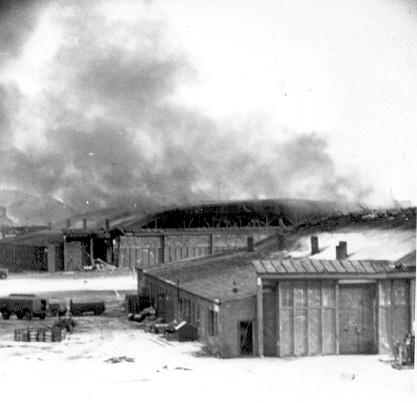 An air attack on Uman in the Cherkasy province in central Ukraine, Jan. 1944
An air attack on Uman in the Cherkasy province in central Ukraine, Jan. 1944
[From Poldi’s Flight Log Book:
Takeoff from Uman since the 25th January. 3 missions flown on 27 January as convoy for an HS 123 dive-bomber unit; dive-bombing attacks against vehicles on the north side of Istaiki; one Stuka attack with bombs, cannon and machine guns against vehicles east of the exit from the village of Medvin. And one dive-bombing attack against Soviet tanks east of Pistarienska. Successful attack carried out by Poldi against Soviet tank, which exploded.
29 January: flew escort for Henschel HS 123 biplane dive bomber unit involving dive-bombing attack against truck column south of Zvenigorodka. (Large numbers of trucks destroyed by direct hits, followed by another dive-bombing attack south of Zvenigorodka; 3 trucks destroyed by bombs, slight anti-aircraft fire. 3rd attack in the same sector against truck columns with satisfactory results.
30-31 January: 3 missions per day, all of them dive-bombing attacks against tanks and trucks near Tikhonovka and Ryzhanovka. Protective escort duty for Henschel HS 123 units near Ryzhanovka .
31 January: In addition, protective escort duty for Junkers JU 52 units in the encirclement battle of Korsun, with dive-bombing attacks against Soviet-occupied Knyazhya and Kvitki; ditto against tanks at Yazvitskaya north of Tsibulev. Enemy contact with two Soviet Lavochkin LaGG-3. Light anti-aircraft fire.
4 February: Another dive-bombing and low-attack with dive bombers, jointly, against Kosakovka; light anti-aircraft fire.
11 February: Dive-bombing attack against truck colums south of Tolstoye. Protective escort for JU 87 and HS 123 units and dive bombing attack against enemy-occupied locality of Sychevka; light anti-aircraft fire. Second mission, likewise with dive-bomber units in the same locality, aerial combat against two Polikarpov I-16 fighter planes. Ammo dump blown up, light anti-aircraft fire.
It seems that with the new commander, Commodore Georg JAKOB, who was trained in the dive bombers and was used to attacking his targets very aggressively in Stuka JU 87 planes from greater heights, our attack tactics are now supposed to be adapted and applied using the FW 190 as well, which is faster, naturally arousing some discontentment among fighter-bomber pilots. After all, they were combat-tested pilots, experienced in low-level surprise attack tactics, in which they themselves were only exposed to anti-aircraft fire for very short periods of time. -WW]
7 February 1944: Very bad weather again, with steady fog for three days now. The Bolshies are so lucky with the weather, you could cry. So we’ve been condemned to sit around for days now, doing nothing. If the sun decides to make a return appearance, I hope to learn to find my way around the Black Sea.
We don’t even get any films to watch anymore. They show the same film all the time, and there are no more newsreels, which is what most interests most of us.
I‘m glad I wore mountain climbing shoes instead of fur boots. With all the mud around here, the other guys are always suffering from wet feet, but my footwear works great.
14 February 1944: Taking off from Nikolayev, we flew several dive-bombing missions against Soviet ammunition dumps and positions east of Apostolovo.
[13 February: low-level attacks with bombs, cannon and machine guns against the Soviet bridgehead of Zolotaya Laka. Very heavy anti-aircraft fire from infantry and anti-tank cannon positions.
Bibi learns that half of all his old school mates from Köslin-NAPOLA have already been killed. -WW]
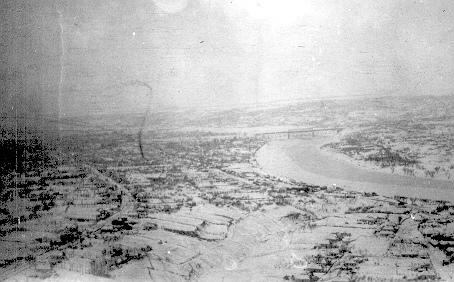
A view from the air of Pervomaisk, Ukraine in February 1944.
18 February 1944: After a short guest appearance on the Black Sea, we’ve withdrawn inland again. So I’ve gotten acquainted with a new country. Unfortunately, the past few weeks have been blessed with fewer missions, since the continuously horrible weather makes flying impossible and then there was all the mud and filth to contend with. Then it froze for three days and now it appears to be thawing a bit.
I just learned that the region around here is really quite fertile and is extensively cultivated, so we took advantage of the opportunity and had a gigantic breakfast today (5 eggs). I’ve been sitting here for three days doing nothing in a strange place because the weather makes it impossible to do anything. But I hope there are a few letters from you waiting for me at my next billet.
23 February 1944: I want to take the opportunity today to write you a very quick letter; I hope it reaches you somewhat more quickly than usual, since I’m a bit closer to home now, that is, I’m with the supply unit. Since I’ve got to take off again tomorrow, I’ll have to finish this quickly. In the meantime, winter has drawn in again. The knee-deep mud and filth have disappeared, so everything looks desolate. This kind of weather is much more comfortable for us, we just hope that the muddy season would finish once and for all, and there would be more action, that’s for sure.
You must have heard what’s going on around here from the Christmas newsreels. We played a big part in breaking out of the Cherkassy pocket, and I flew a lot of missions. Unfortunately, the weather wasn’t exactly allied with us, and we were really happy when we heard that our relief efforts had finally been successful.
To be continued: The Battle on the Dneipr and Sevastopol
Tags
Ukraine, Vienna Luftwaffe officers hospital, Lemberg, Berditschev, Lt. Erhard Nippa, Bolsheviks, Wochenschau, Armed Forces Report, Christmas Eve celebration on Eastern Front, belly flop landing, Commodore Georg Jakob, dive bombing tactics, Cherkasy pocket yCategory
Germany, Leopold Wenger, World War II- Printer-friendly version
- 4048 reads









